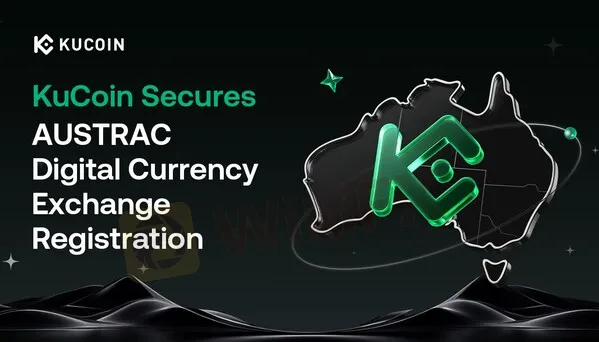FCA Warns on Complex ETP Sales Practices
UK FCA urges firms to tighten complex ETP sales, citing rising retail demand and risks tied to leverage and social media promotions.
简体中文
繁體中文
English
Pусский
日本語
ภาษาไทย
Tiếng Việt
Bahasa Indonesia
Español
हिन्दी
Filippiiniläinen
Français
Deutsch
Português
Türkçe
한국어
العربية
Abstract:KuCoin AUSTRAC Registration and AFSL-backed Australian crypto futures, plus a new KuCoin Australia fiat on-ramp, mark a pivotal shift for local traders.

Australia‘s digital asset sector has reached a new inflection point as KuCoin’s AUSTRAC Registration anchors its crypto exchange, derivatives, and fiat access within a more clearly supervised local framework. For Australian traders, the combined impact of KuCoin AUSTRAC Registration, AFSL-supported Australian crypto futures, and the KuCoin Australia fiat on-ramp signals a decisive move toward regulated growth rather than speculative experimentation.
At the core of this development is KuCoin AUSTRAC Registration as a Digital Currency Exchange (DCE), placing the platform‘s Australian entity directly under AUSTRAC’s anti-money laundering and counter-terrorism financing oversight. Registration is a legal prerequisite for digital currency exchanges servicing local users, and AUSTRACs regime is designed to enforce stringent reporting, customer due diligence, and transaction-monitoring standards.
Regulators in Australia have steadily tightened their stance on offshore platforms, with AUSTRAC and ASIC emphasising that many crypto products now resemble traditional financial instruments in risk and structure. Within that context, KuCoin AUSTRAC Registration effectively shifts the exchange from an offshore grey zone into a supervised environment, bringing Australian users under clearer rules for onboarding, record-keeping, and suspicious matter reporting.

This regulatory milestone also aligns with broader policy debates in Canberra about how to integrate digital assets into the mainstream financial system without compromising consumer protection. Industry participants note that formal AUSTRAC oversight can help weed out poorly governed operators while rewarding exchanges that invest in robust compliance controls, transaction monitoring technology, and transparent governance.
Beyond spot trading, the Australian crypto futures AFSL framework emerging through KuCoin‘s partnership with Echuca Trading is drawing attention from sophisticated traders and institutions. Echuca Trading, which holds an Australian Financial Services Licence issued by ASIC, is providing the AFSL-regulated structure that wraps KuCoin’s Australian crypto futures offering in rules more familiar to traditional derivatives markets.
In practice, this means that Australian crypto futures AFSL arrangements are expected to be subject to obligations around disclosure, risk warnings, client classification, and dispute resolution that mirror those applied to other leveraged products. For wholesale and high-volume participants, that structure can be critical for internal risk committees, auditors, and compliance teams who must justify exposure to digital asset derivatives within established policy frameworks.
The AFSL-backed model is also likely to shape how product design and leverage limits evolve for Australian crypto futures, as ASIC has previously signalled concerns about highly leveraged, complex retail derivatives. If the Australian crypto futures AFSL pathway proves workable, other global exchanges may be pushed to adopt similar partnerships or licensing strategies, triggering a broader migration from unregulated perpetual swaps to futures products aligned with local conduct and disclosure rules.
Complementing these regulatory steps is the KuCoin Australia fiat on-ramp, which allows Australian users to fund accounts using local currency through bank transfers and domestic payment rails. The KuCoin Australia fiat on-ramp reduces dependence on offshore stablecoin transfers and unregulated payment intermediaries, bringing deposits and withdrawals closer to the protections of the traditional banking system.
For everyday traders, the combination of KuCoin AUSTRAC Registration and a local fiat on-ramp translates into more predictable access to liquidity, clearer recourse channels, and potentially lower friction in moving between Australian dollars and digital assets. It also positions KuCoin to compete more directly with domestic platforms that already offer AUD pairs, with the added appeal of global liquidity and a broad token listing universe.
From a market-structure perspective, the alignment of spot trading, Australian crypto futures AFSL coverage, and KuCoin Australia fiat on-ramp services suggests a maturing landscape where compliance and user experience reinforce each other rather than pulling in opposite directions. As AUSTRAC and ASIC continue to refine guidance on token classification, custody, and disclosure, early movers that integrate AUSTRAC registration, AFSL-regulated derivatives, and fiat gateways are likely to set the benchmark for sustainable growth in Australias digital asset ecosystem.

Disclaimer:
The views in this article only represent the author's personal views, and do not constitute investment advice on this platform. This platform does not guarantee the accuracy, completeness and timeliness of the information in the article, and will not be liable for any loss caused by the use of or reliance on the information in the article.

UK FCA urges firms to tighten complex ETP sales, citing rising retail demand and risks tied to leverage and social media promotions.

IG raises rates on uninvested cash and removes inactivity fees, joining a growing trend among brokers targeting UK retail investors.

Gold surges past $4,500 amid global unrest and rate-cut expectations, with investors eyeing the upcoming US jobs and PMI reports.

Police busted 97 online scam cases and seized more than RM5 million, in a series of integrated operations conducted in the capital throughout last year.
